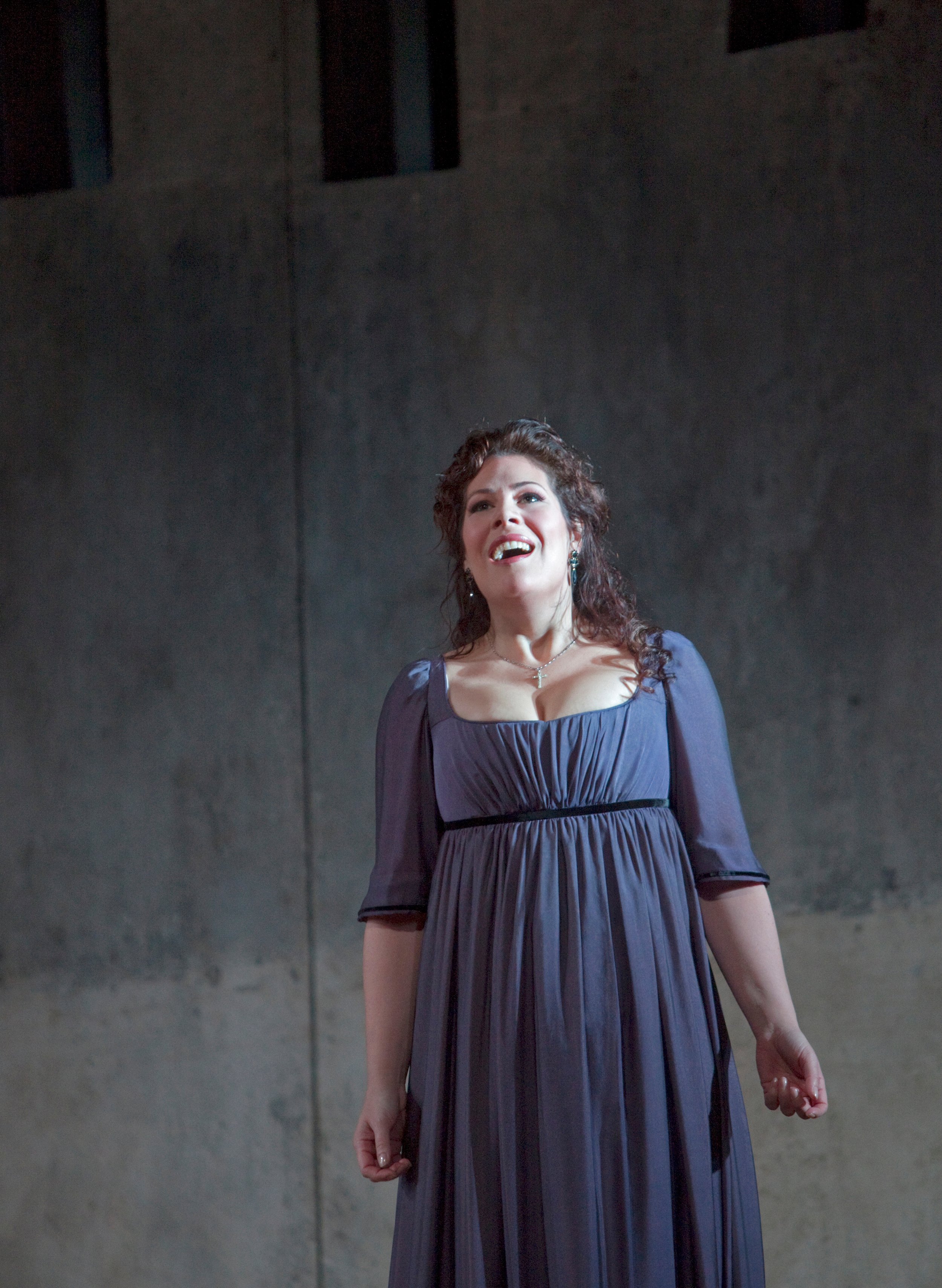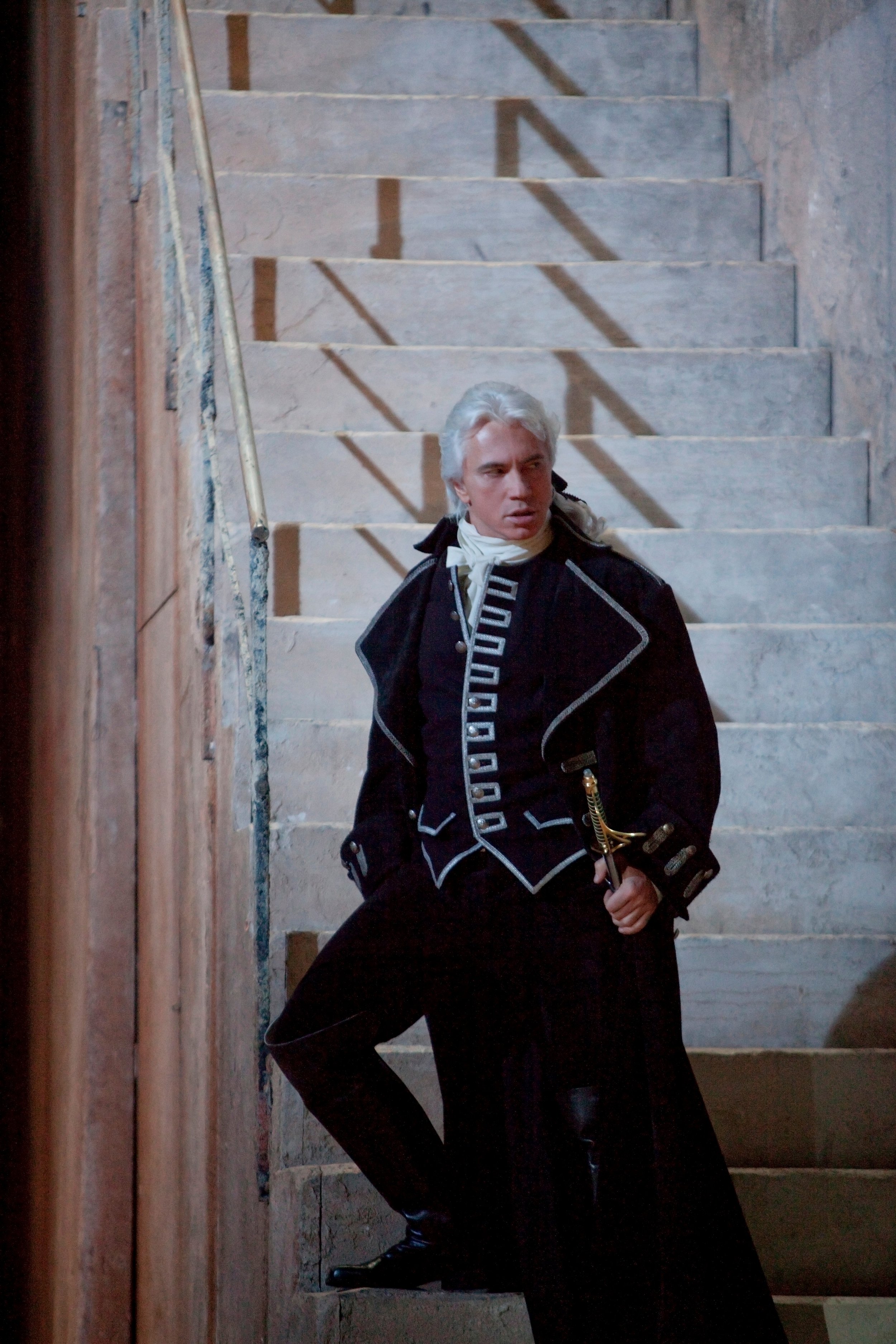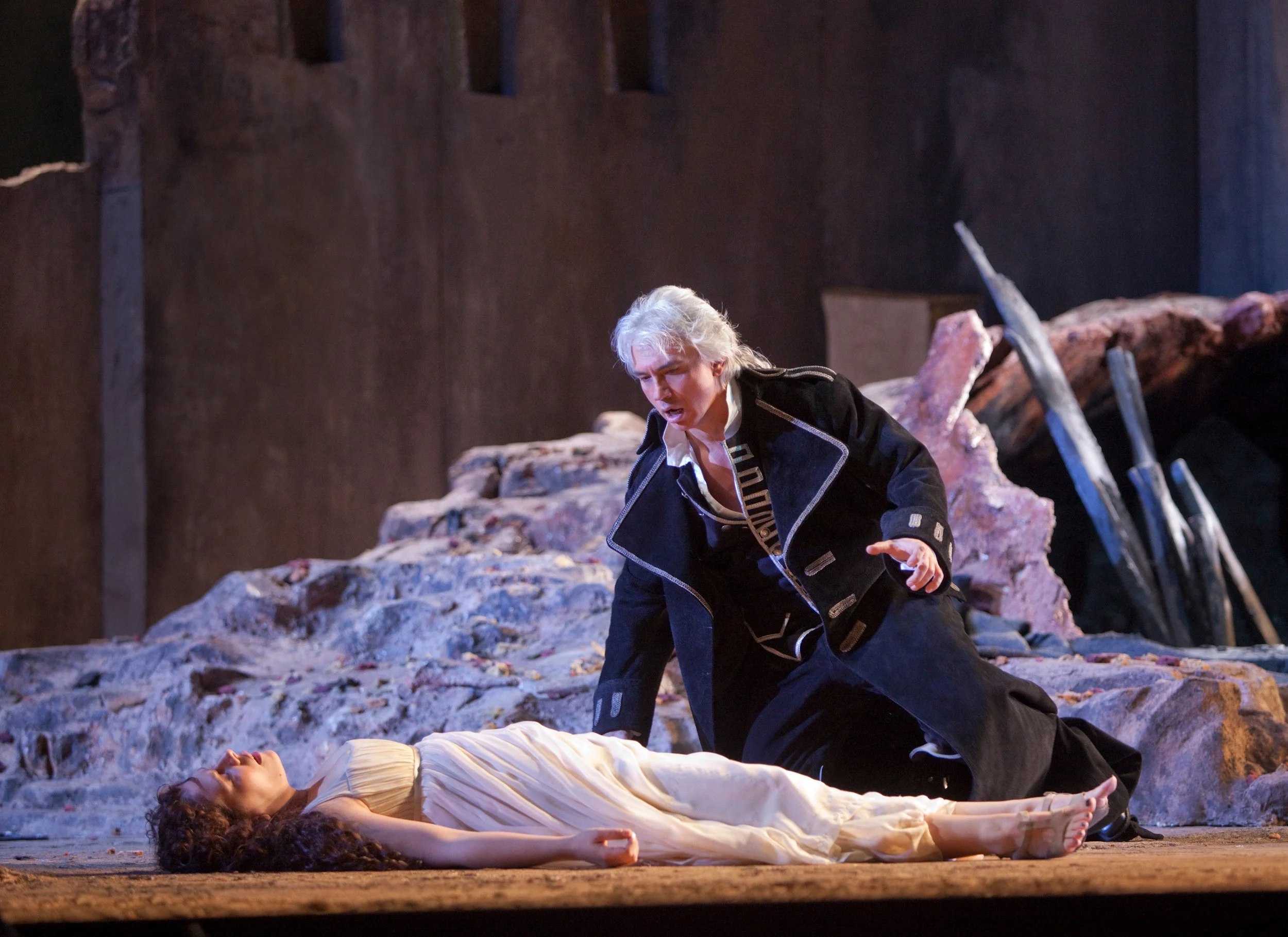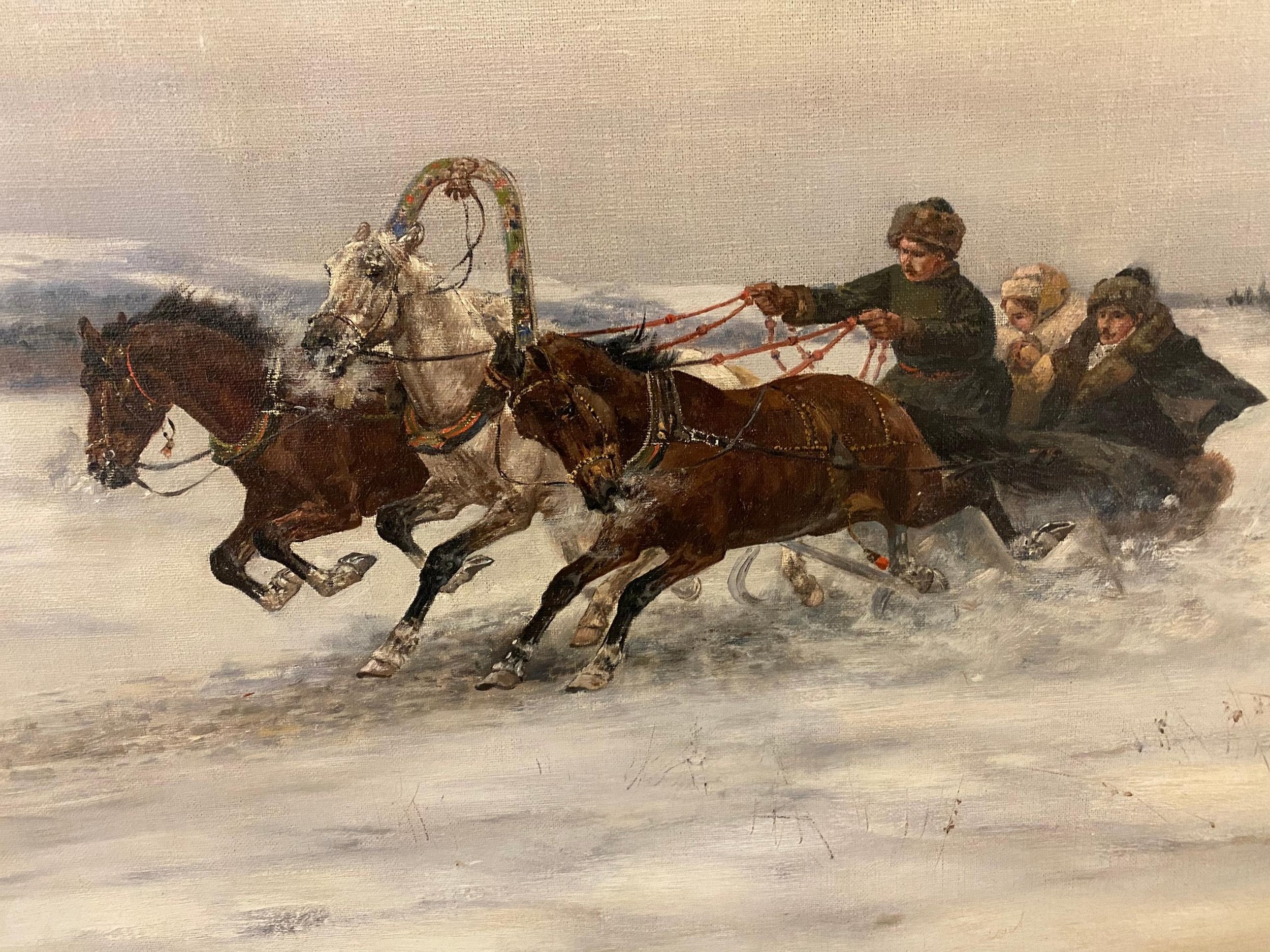Cinematic Adventures: Il Trovatore (2010-11)
Marcelo Álvarez and Sondra Radvanovsky in Il Trovatore (Ken Howard/Met Opera)
Every summer, the Met does its best to ease our opera cravings with four HD cinema broadcasts from seasons past. This year, it’s Akhnaten (it was on July 26, from the 2019-20 season.), Il Trovatore (August 2, from 2010-11), Il Barbiere di Siviglia (August 9, from 2014-15), and Eugene Onegin (August 16, from 2006-07).
Now, I haven’t been to the cinema since COVID struck, but the idea of Verdi’s riveting Trovatore with Sondra Radvanovsky and Dmitri Hvorostovsky was too much to resist.
I did not regret it. I settled into my seat, smiling at the familiar old Bloomberg and Rolex advertisements and Live in HD trailer. (We were spared any pre-show movie trailers.) First to sing was the excellent Stefan Kocán, a sturdy, rich-voiced Slovakian bass, who told the tale of the Count di Luna in “Di due figli” with the eerieness of a ghost story. I hope to see him in Trovatore — and other operas — for many years to come.
Sondra Radvanovsky in Il Trovatore (Ken Howard/Met Opera)
Then came the star of the show. I saw Sondra Radvanovsky in Aida years ago, but other than the glorious production (and Verdi’s equally glorious score), I came away disappointed. Clearly, I caught Sondra on a bad day; readers of this blog voted her Medea the Best Soprano Performance of 2022-23 and she is considered one of today’s greatest singers, so I was excited to see what she's like at full power.
Well, she is extraordinary, a veritable stage animal. This Leonora — there are at least three others in opera! — is a relatively gentle heroine, but Sondra imbued her with a fire that, oddly, fit perfectly. Imagine her as other, typically fiercer, characters! She wasn’t only flame, however; her portrayal was rounded and riveting. We felt vulnerable with her in “Vivrà! contende il giubilo”; until the poison took effect, Leonora belonged to the dreaded Count. If I had a dollar for every time one of the men manhandled her, I could buy a bucket of popcorn. There were even moments of joy, rare in Verdi.
Of course, it’s not just acting that creates a world-class artist, but Sondra’s vibrant, steely voice has a thrilling quality similar to her dramatism, making soaring leaps and dizzying cabalettas sound like a breathtaking breeze. Near the end of “Tu vedrai che amore in terra,” my seat neighbor whispered, “Oh my God,” and during the applause, said, “That was unbelievable!” That was an understatement. Now I want to hear her Aida again!
Dmitri Hvorostovsky in Il Trovatore (Ken Howard/Met Opera)
Dmitri Hvorostovsky, sometimes known as Dima, died of cancer in 2017 at only 55. His was one of the opera world’s most painful and deeply felt losses. His kindly, sunny demeanor earned him the status of The People’s Baritone, and when he sang “Il balen del suo sorriso d’una stella vince il raggio,” (Her smile outshines a star) one could have thought he was singing of himself. Count di Luna doesn’t smile much, though, and here Dima’s air was of danger and authority. Standing at 6’4”, he possessed an imposing presence. His hair was silver but his voice was golden, like an aristocratic cat’s; he could purr charmingly, growl threateningly, or simply exist nobly. There was a funny moment that, I think, says how careful one is at the Met; Dima released Sondra from his grip with a gentle nudge, yet she fell to the floor. The fight scenes in Medea were better.
Intermission came, and I enjoyed the two interviews that Renée Fleming, who was hosting, conducted, one with Sondra and Marcelo Álvarez and one with Dima and Dolora Zajick. Zajick declared that everyone in this opera is crazy. Can’t really argue! My favorite intermission pastime is making conversation with my seat neighbors, and mine turned out to be an older lady. She was a great fan of Dima’s, and had never seen Trovatore before. She asked if I had a favorite opera; no, but I listed some of my favorites before returning the question. Her answer was the same as mine. Perfectly fine!
No reason to watch the soldiers making out with disreputable-looking women at the beginning of Act 2, so we left the theater for about five minutes. That’s one of the nice things about the cinema — you can pop in and out at whim. I amused myself by peeking at the other movies on our side of the cinema: Barbie, Haunted Mansion, and the new Mission Impossible movie. (Approximately 1/17th of the screen was visible from the hall.)
Dolora Zajick in Il Trovatore (Ken Howard/Met Opera)
Dolora Zajick was solid, singing with considerable heft and steadiness, and dramatically intense. She was splendid; I’d even call her the second-best Azucena I’ve ever heard. She seemed to cry convincingly at various points and was sometimes tormented, sometimes cold and calculating, sometimes frightening, sometimes all of these at once.
Marcelo Álvarez sang Manrico with much flair and vigor. Panache is very well and all that, but his, unfortunately, came at the sacrifice of legato. The direction he got didn’t do him any favors; as Dima gripped Sondra’s wrist and neck, Álvarez stood rubbing his head anxiously rather than helping her. He and Sondra did have good chemistry and were unfailingly gentle and attentive to each other. Once, during “Di quella pira,” I chuckled, thinking about how ridiculous the aria is. Oh, my mother is about to be burnt at the stake? Oh no! I must save her immediately! But first I’ll sing an aria about how I must hurry. Admittedly, I would have laughed no matter the singer. He sang the showcase aria urgently, and pulled off the high Cs admirably!
Just the final minute of the opera is a masterclass in musical drama. Leonora’s vocal line in “Addio" (Farewell) rises to heaven with a high A, then sinks down more than an octave with the words “io moro.” I’m dying. Then she dies.
Sondra Radvanovsky and Dmitri Hvorostovsky in Il Trovatore (Ken Howard/Met Opera)
The orchestra bursts out with a heavy set of descending chords. Realizing he has been tricked, di Luna orders Manrico to his execution. Azucena wakes up and sings “Stop! Listen! Heavens!”
“He is dead!” trumpets di Luna, with a blast from the pit. (That was fast; it’s been about 20 seconds since Manrico was dragged off.) Both lovers have now died within half a minute of each other. Wait! It gets worse.
Azucena turns to him with a savage expression. A literal drumroll, then she drops the bombshell with a single note, revealing her true colors. “He was your brother!” She could have told the Count. She could have saved Manrico.
Di Luna starts, and cries out his abject horror. “You are avenged, Mother!” proclaims Azucena, jumping up to a note even higher than Leonora’s dying A, while the Count sinks to his knees by Leonora’s corpse and laments that he himself still lives. A version of the set of chords return as the curtain sinks too. Both laughing and crying, the final triumph is Azucena’s.
As an optimist, I like to think that the Count decides that enough blood has been shed and spares her life, though that's unlikely. If you could write an epilogue to Trovatore, what would become of Azucena?
After the screen went black, my neighbor bid adieu with the words, “Well, now I have a favorite.” Not a bad pick! Trovatore turned out to be a fantastic welcome back to movie theaters. I want to return next week to see Eugene Onegin, starring Renée Fleming — and Dima. Get thee to a cinema!








